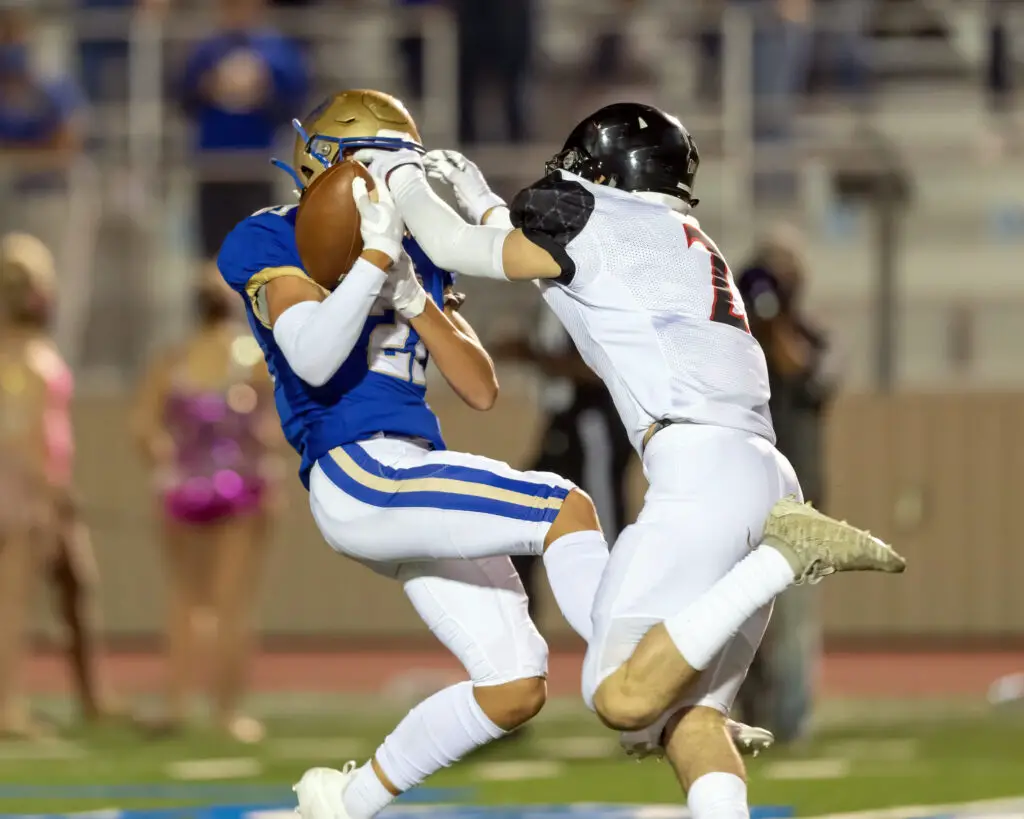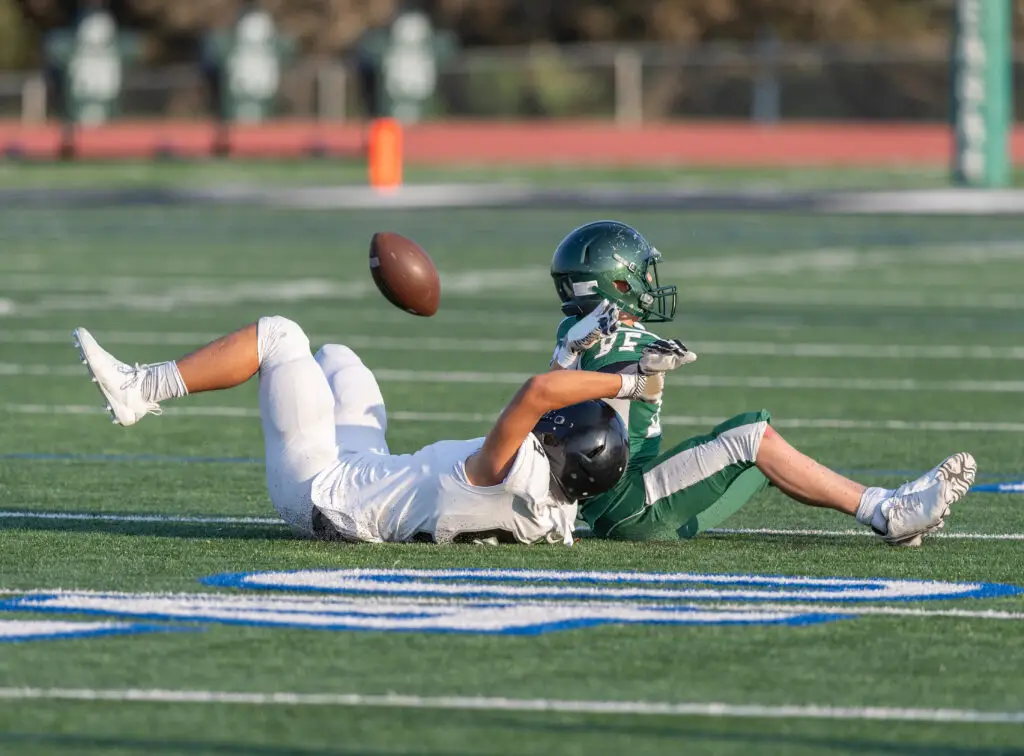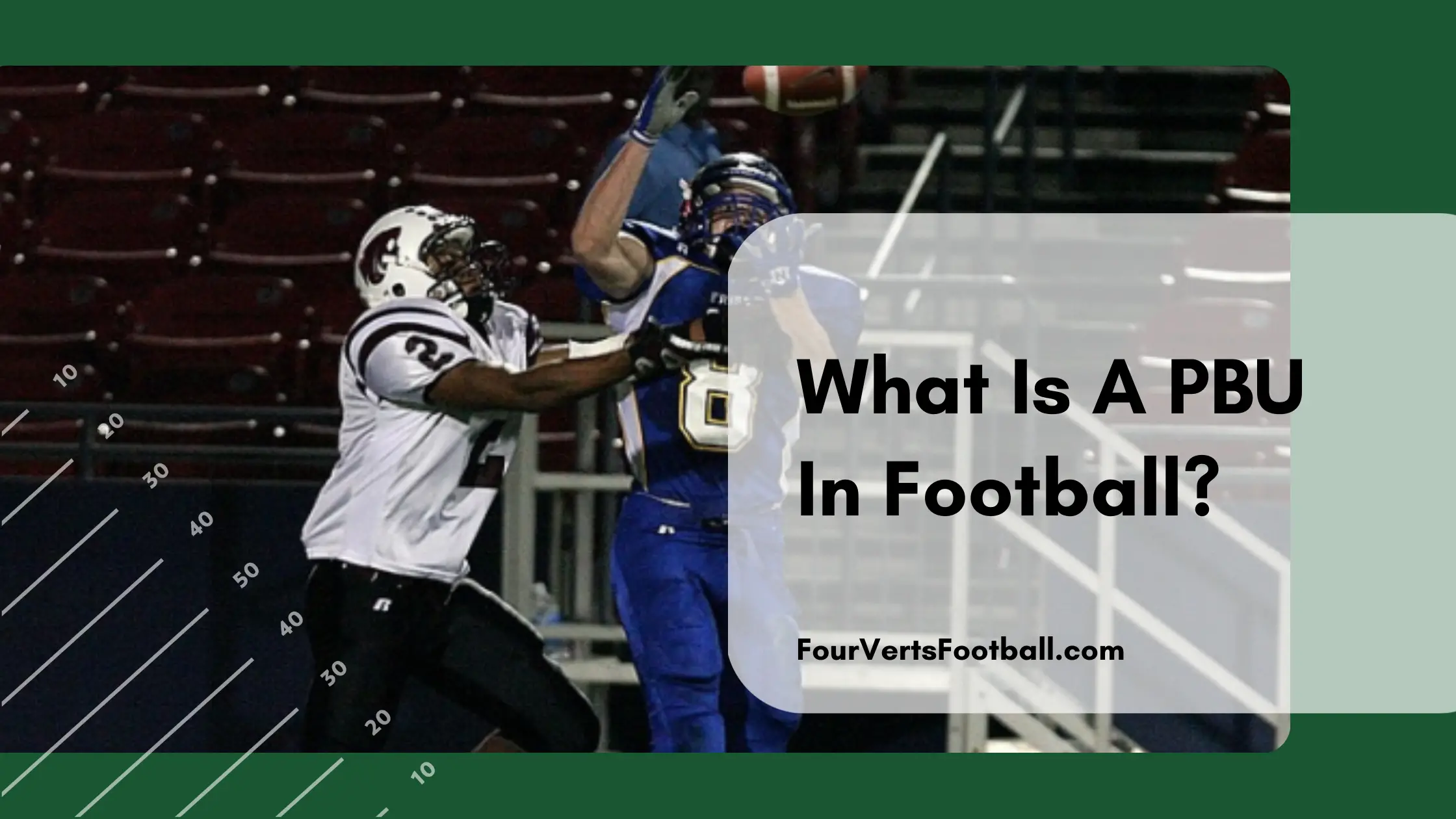A PBU in football stands for pass break up. This refers to a play in which a defensive player tips or knocks down a pass without intercepting the ball. Any sort of contact on the ball that results in an incompletion is credited as a PBU.
What Positions Get The Most PBUs
Getting a pass break up is one of the better plays you can achieve as a defensive player. You will notice that each position that earns a large number of PBUs tend to wear football gloves.
This is because these players are often going to have a good shot at intercepting the ball.
Cornerbacks
The position that far and away gets the most pass breakups each season is cornerback. This, of course, makes sense as these players are typically the position who play closest to the receivers each play.
In the 2020 NFL season, Carlton Davis led the league with twenty one pass breakups. In fact, the top ten players in pass break up last year were all cornerbacks.
Safety
The safety position is the next most likely job that will earn a player some pbus.
The non-corner with the most PBUs in 2020 was Jesse Bates of the Cincinnati Bengals. His fifteen pass breakups were good enough to land him 11th most in the league last year.
Safeties are often tasked with protecting the defensive backfield from deep passes. When these passes come their way they will often bat or tip the pass away from the receiver.
Any sort of contact on a pass is going to count as a PBU if the ball is not caught.

Linebacker
The linebacker position is another that is often able to break up passes from the quarterback. Oftentimes linebackers play underneath coverage meaning they cover the area close to the line of scrimmage.
Quarterbacks will often sail passes over the top of these linebackers to receivers further down the field. In these situations, the linebackers will put their hands up in an attempt to get into the throwing lane.
This results in a fair number of batted balls throughout a season. These players also play one on one coverage and on some occasions will break passes up that way.
But you will find that most linebackers earn their PBUs from tipping or batting passes meant to go deeper downfield.
Defensive Tackles
Defensive tackles are a position that many would not expect to swat passes in football. Since these players almost never play pass coverage many fans don’t know how often these players break up passes.
When a defensive tackle notices that he is not going to get to the quarterback on a pass rush he will start watching the quarterbacks eyes. When the tackle notices the quarterback about to throw he will then jump into the air with his hands up.
By watching the quarterbacks eyes these defensive linemen are usually able to tell which direction the quarterback is throwing.
This results in a ton of balls being batted down at the line of scrimmage. On some occasions, these balls are batted straight up and caught for an interception.
Are PBUs A Good Stat Judge The Abilities Of Your Cornerback?
Now that you understand what PBUs are you may be wondering what you can do with this information. Is it as simple as checking the number of PBUs a defender had to determine if he is any good?
Unfortunately, the answer to this question is no PBUs can be a helpful stat but they aren’t a great way to judge the quality of your defensive back. Here’s why:
When a cornerback is playing at the top of his game quarterbacks often choose to stay out of his way. This is because throwing towards the top defensive backs in the league usually doesn’t turn out well for the offense.
The result of this is that some of the top corners in the league do not receiver many passes in their direction. For this reason, they have a much harder time getting PBUs as they have fewer chances to knock balls down.
This same standard works for tackles. Oftentimes you will see corners and safeties with a high number of tackles. This isn’t necessarily a bad sign but in many situations, this is due to poor defence. If the defensive line and linebackers can’t make the tackle it is up to the DBs.
This is why you have to be sure to take into account all factors when looking at statistics. This is especially true for defensive players who only make players based on what the offense does. As opposed to offensive players which you can ensure the ball will get in their hands.
Is A Dropped Interception A Pass Breakup?
Yes, a dropped interception is in fact a pass breakup. Even though these plays are tough to watch as a fan it fits all the criteria of a pass breakup. If a throw to a receiver is contacted by a defender and results in an incomplete pass then it is a pass breakup.
This is another reason that the PBU stat may not be the best judge of the quality of a cornerback or safety.

Pass Breakup Or Interception
The vast majority of the time a ball comes a defenders way he should get the interception if possible. But on a few occasions, it actually makes more sense for a defensive player to swat the ball down instead of intercepting it.
Going Deep On 4th Down
One situation in which a player should prioritize a pbu over an interception is when the ball is thrown deep on fourth and long.
On fourth down if the offensive team does not get the ball to the first down marker they will lose possession. The defensive team will then take possession where their opponents drive ended.
Intercepting a deep pass on fourth and long is going to result in the defense getting possession of the ball much further down the field.
Unless the player who intercepted the ball is able to return it past the location where the opponents drive ended then he should drop the ball. The superior field position of starting where the opponents drive ended is going to make knocking down the pass the better play.
Hail Mary
A hail mary is another occasion in which players are instructed to knock a ball down instead of trying to intercept it.
A hail mary in football is a long desperation pass typically thrown in the dying seconds of a game. On these plays waiting for the ball to come into the arms of a defender is not the smartest play.
By waiting for the ball the offense has a better chance of finding a way to make the catch or even rip the ball from the defender’s hands.
Instead, players are instructed to go for the PBU and intentionally bat the ball down out of the air. This way the defenders can reach out for the ball first with outstretched hands as they are only looking to get a tip on the ball.
And since these plays are made in the dying seconds of the game is does not matter if the ball is intercepted or not.
That is all on PBUs in football to learn more about defensive back statistics see our article on passes defensed.

